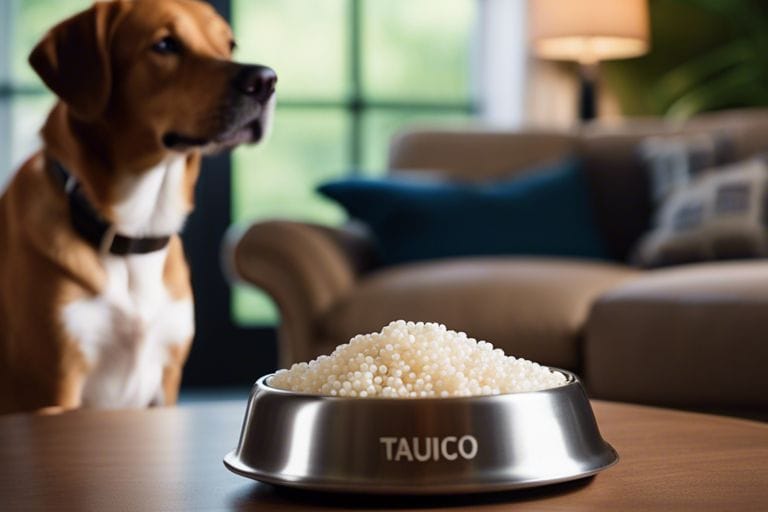Can Dogs Eat Tapioca? Essential Tips for Pet Owners!
Curious about whether you can share your love for tapioca with your furry friend? Tapioca is a starchy substance extracted from the cassava plant, and although it is not toxic to dogs, there are some important things to consider before adding it to your pet’s diet. As a responsible pet owner, it’s crucial to be aware of the potential risks and benefits of feeding tapioca to your dog. In this informative blog post, we will discuss the nutritional value of tapioca, how it can impact your dog’s health, and provide essential tips for safely incorporating it into your pet’s diet.
Key Takeaways:
- Tapioca is generally safe for dogs to eat. When prepared properly and given in moderation, tapioca is a safe and easy-to-digest option for dogs.
- Avoid feeding dogs tapioca pudding or products with added sugar. These can be harmful to dogs and may cause gastrointestinal issues or other health problems.
- Consult with a veterinarian before introducing tapioca into your dog’s diet. It’s important to get professional advice and ensure tapioca is a suitable option for your specific pet.
Understanding Tapioca
Now, let’s delve into the world of tapioca and understand what it is and its nutritional components. Tapioca is a starch extracted from cassava root, a tuber native to South America. It is a gluten-free and grain-free alternative, making it a popular choice in various culinary applications, including as a thickening agent in soups, sauces, and desserts.
What is Tapioca?
Tapioca is essentially a flavorless, odorless starch that is commonly used as a thickening agent in cooking. It is made from the starchy liquid extracted from the cassava root. The liquid is then processed to form small, pearl-like granules, which are the tapioca pearls commonly used in puddings and bubble teas.
Nutritional Components of Tapioca
Tapioca is mainly composed of starch, which provides a quick source of energy. It is also low in calories and contains minimal amounts of fat, protein, and fiber. However, it’s important to note that tapioca is high in carbohydrates and has a high glycemic index, which means it can cause a rapid spike in blood sugar levels.

Tapioca and Dogs
Any responsible pet owner knows the importance of being cautious and selective about what they feed their furry friends. When it comes to tapioca, you may have heard mixed opinions about whether or not it is safe for dogs to consume. In this chapter, we will take a closer look at the connection between tapioca and dogs, exploring the potential benefits and risks of this starchy food.
Can Dogs Safely Consume Tapioca?
Yes, dogs can safely consume tapioca in moderation. Tapioca is a gluten-free carbohydrate that can serve as an alternative to wheat and grains for dogs with food sensitivities. It is also low in sodium and cholesterol, making it a suitable option for dogs with certain dietary restrictions. However, it is important to note that excessive consumption of tapioca can lead to digestive issues such as bloating and gas in dogs. Therefore, it is essential to introduce tapioca into your dog’s diet gradually and in appropriate portions. Always consult with your veterinarian before making any significant changes to your dog’s diet to ensure it aligns with their specific health needs.
Potential Health Benefits and Risks
When introduced in moderation, tapioca can provide a range of potential health benefits for your dog. Its low sodium and cholesterol content make it a heart-healthy option for dogs with cardiovascular issues. Additionally, tapioca is rich in carbohydrates, providing a good source of energy for your furry friend. On the other hand, overfeeding tapioca to your dog can lead to weight gain and potential digestive issues. It is crucial to monitor your dog’s tapioca intake and ensure it is balanced with other essential nutrients from their diet.
Feeding Your Dog Tapioca
Unlike other foods that may be toxic to your dog, tapioca is safe for your furry friend to consume. Tapioca is a starch extracted from the cassava root and is often used in pet treats because it is gluten-free and easily digestible. However, like any new food, it’s important to introduce tapioca into your dog’s diet gradually and in appropriate quantities.
How to Introduce Tapioca Into Your Dog’s Diet
When introducing tapioca into your dog’s diet, start by mixing a small amount with their regular food. This will allow them to get used to the new taste and texture without overwhelming their system. Gradually increase the amount of tapioca over the course of a week or two, while monitoring for any signs of digestive upset. If your dog experiences loose stools or any other gastrointestinal issues, it’s best to discontinue feeding them tapioca and consult with your veterinarian.
Appropriate Quantities and Frequency
When feeding your dog tapioca, it’s important to do so in moderation. Tapioca should only comprise a small portion of their overall diet, as it is not a complete source of nutrition. Additionally, feeding your dog tapioca too frequently or in large quantities can lead to weight gain and potential digestive issues. You should also be cautious if your dog has diabetes, as tapioca is high in carbohydrates, which can cause an increase in blood sugar levels. Your veterinarian can provide specific guidance on the appropriate quantity and frequency of tapioca for your individual dog.
Essential Tips and Considerations
Keep tapioca free from any harmful additives like sugar, especially xylitol, which is toxic to dogs. Be sure to serve tapioca in small quantities as a part of a well-balanced diet. Keep an eye out for any gastrointestinal upset or allergic reactions. Any questions or concerns about feeding tapioca to your dog should be discussed with your veterinarian. If you want to learn more about whether tapioca is safe for dogs, you can read this helpful article on Can Dogs Eat Tapioca? What You Need To Know.
Allergic Reactions and Food Intolerances
It’s essential to monitor your dog for any signs of allergic reactions or food intolerances when introducing new foods like tapioca into their diet. Look for symptoms such as itching, swelling, rashes, vomiting, or diarrhea. If you notice any of these symptoms after feeding your dog tapioca, it’s crucial to discontinue feeding and consult your veterinarian immediately.
When to Consult Your Veterinarian
If you have any doubts about whether tapioca is suitable for your dog, or if you notice any unusual symptoms or behaviors after feeding them tapioca, it’s crucial to seek guidance from your veterinarian. While tapioca can be safe for some dogs, others may have allergic reactions or food intolerances that need to be addressed by a professional. Your veterinarian can provide tailored advice based on your dog‘s specific health needs.

Can Dogs Eat Tapioca? Essential Tips for Pet Owners!
With these considerations in mind, it is important to always consult with your veterinarian before introducing tapioca into your dog’s diet. While tapioca itself is not inherently toxic to dogs, it may not be the most suitable option for all pets. Additionally, be cautious of added ingredients such as sugar or flavorings that could be harmful to your dog. As a responsible pet owner, it is crucial to be informed and cautious when it comes to your dog’s diet and health. By following these essential tips, you can ensure that your furry friend stays happy and healthy. Remember, when in doubt, always consult with a professional. Your dog’s well-being is worth the extra effort and vigilance.
FAQ
Q: Can dogs eat tapioca?
A: Yes, dogs can eat tapioca in moderation. Tapioca is a starchy substance that is safe for dogs to consume and can be a good source of carbohydrates in their diet.
Q: Are there any potential risks of feeding tapioca to dogs?
A: While tapioca is generally safe for dogs, it is important to feed it in moderation. Excessive consumption of tapioca can lead to gastrointestinal upset and potentially cause bloating or other digestive issues in dogs. Additionally, tapioca should not be fed to dogs as a substitute for a balanced and complete diet.
Q: How should tapioca be prepared for dogs?
A: Tapioca should be cooked thoroughly before feeding it to dogs. It is best to prepare tapioca in a plain and simple manner, without adding any potentially harmful ingredients such as sugar or artificial sweeteners. Additionally, it is important to take into consideration any potential allergies or sensitivities that your dog may have before introducing them to tapioca. Always consult with your veterinarian before making any significant changes to your dog’s diet.

